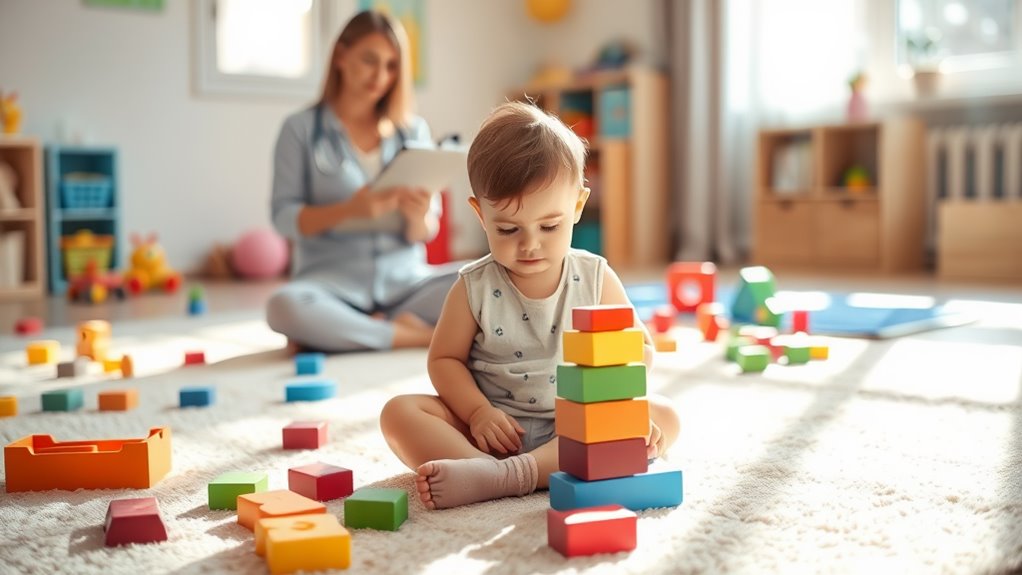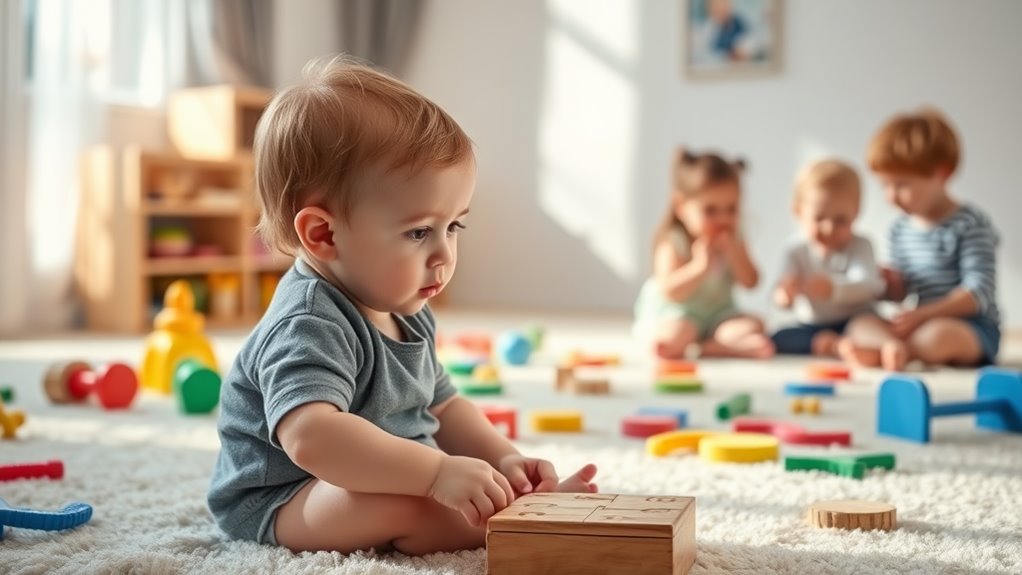Are You Missing These Critical Signs of Child Development
You might be overlooking critical signs of your child’s development. Pay close attention to their physical milestones, like crawling and walking, as well as their ability to use language and express emotions. Social skills, such as sharing and playing with peers, are key indicators too. Observing their curiosity and problem-solving abilities can reveal much about cognitive growth. Missing these signs can lead to challenges, so tracking development closely is vital. Early intervention can foster a healthier path for your child. Discovering more about these signs and how to respond can lead to effective support strategies.
Key Takeaways
- Observe physical milestones like crawling, walking, and grasping to ensure your child is developing gross and fine motor skills appropriately.
- Monitor language skills such as babbling and sentence formation to track communication development and identify any potential speech delays.
- Watch for cognitive growth indicators like problem-solving, memory recall, and curiosity to assess your child’s intellectual development.
- Recognize social skills including initiating play, sharing, and expressing emotions to understand your child’s ability to form relationships.
- Consult with a pediatrician if developmental delays are suspected, as early intervention can significantly enhance your child’s growth and well-being.
Recognizing Physical Milestones
When it comes to recognizing physical milestones in your child, it’s crucial to pay attention to their movements and coordination during everyday activities. Understanding the difference between gross motor and fine motor skills will help you identify these milestones effectively. Gross motor skills involve larger movements, like crawling, walking, and jumping. Watch how your child navigates their environment; are they running confidently or stumbling? These observations can indicate their physical development.
On the other hand, fine motor skills pertain to smaller, more precise movements, such as grasping small objects or using utensils. Notice how your child manipulates toys or attempts to draw. Are they able to stack blocks or thread beads? These tasks showcase their hand-eye coordination and dexterity, which are vital for later skills like writing.
Tracking these physical milestones isn’t just about checking boxes—it’s about understanding your child’s unique development journey. If you spot delays or concerns, don’t hesitate to consult a pediatrician. You’re playing an essential role in fostering your child’s growth, so stay observant and engaged. Recognizing these signs will empower you to support their physical development effectively.
Understanding Social Development
Social development is a vital aspect of your child’s growth, shaping their ability to interact with others and form relationships. As you observe your child’s journey, it’s essential to recognize the key elements that contribute to their social skills. Engaging in playful interactions with peers lays the groundwork for healthy peer relationships, fostering cooperation, empathy, and conflict resolution.
Here are three critical signs to watch for in your child’s social development:
-
Initiating Play: Your child should actively seek out peers to engage in games, demonstrating their comfort in social settings.
-
Sharing and Taking Turns: Observe how well your child shares toys or takes turns during play. This skill indicates their understanding of social norms and respect for others.
-
Expressing Emotions: Notice if your child can recognize and articulate their feelings, as well as respond to the emotions of others. This emotional intelligence is crucial for building strong relationships.
Monitoring Language Skills
Monitoring your child’s language skills is crucial for their overall development, as effective communication plays a key role in their ability to express thoughts and connect with others. Observing how your child engages in language acquisition helps you identify their strengths and areas for growth. Pay attention to milestones like babbling, forming simple sentences, and using new vocabulary.
As your child develops, their verbal expression will evolve. Notice if they can articulate feelings or describe experiences clearly. Frequent conversations not only enhance their vocabulary but also build confidence in their communication skills. Encourage storytelling and ask open-ended questions to stimulate their verbal abilities.
Be mindful of any signs of struggle, like difficulty in pronouncing words or forming sentences. These could indicate a need for additional support. Remember, every child develops at their own pace, but consistent monitoring can help you recognize when to seek guidance from professionals if necessary.
Assessing Cognitive Growth
How can you effectively gauge your child’s cognitive growth? Understanding cognitive development is crucial for nurturing your child’s intellectual abilities. By observing specific behaviors and milestones, you can assess their progress against established cognitive benchmarks. Here are three essential indicators to consider:
-
Problem Solving Skills: Watch how your child approaches challenges. Are they able to think critically and find solutions independently? Increased problem-solving abilities indicate cognitive advancement.
-
Memory Development: Notice how well your child remembers and recalls information. Do they grasp new concepts quickly? A growing memory capacity reflects cognitive maturity.
-
Curiosity and Exploration: Take note of your child’s inquisitiveness. Are they asking questions, seeking to understand the world around them? An active desire to learn is a strong indicator of cognitive growth.
Evaluating Emotional Progress
As your child grows, it’s vital to pay attention to their emotional development, which can significantly influence their overall well-being. Observing how your child navigates their feelings can provide key insights into their emotional regulation. Are they able to express their emotions appropriately, or do they often experience overwhelming reactions? Children typically develop these skills in stages, so recognizing when they struggle can help you support their growth.
Empathy development is another critical component. Notice how your child responds to the emotions of others. Do they show concern when a friend is upset, or do they struggle to understand how others feel? Fostering empathy can enhance their relationships and social skills. Encourage discussions about feelings, both theirs and those of others, to nurture this important trait.
Moreover, consider how your child copes with frustration or disappointment. Are they able to calm down independently, or do they rely heavily on you for support? These observations can guide you in helping them build resilience and emotional intelligence. By staying attuned to these aspects of their emotional progress, you can lay a solid foundation for their future relationships and well-being.
Importance of Early Intervention
Recognizing the signs of developmental delays early can make a huge difference in your child’s growth. When you track milestones and seek timely support, you’re not just addressing immediate concerns but also setting the stage for long-term benefits. Early intervention can transform challenges into opportunities, helping your child thrive.
Timely Support Matters
Early intervention can be a game changer in a child’s development, making timely support crucial for addressing potential challenges. When you notice signs that your child might need extra help, acting promptly can set them on a path to success. Timely interventions not only boost developmental progress but also reinforce essential support systems for both you and your child.
Here are three key reasons why timely support matters:
-
Enhanced Development: Early assistance can significantly improve skills in areas like communication, social interaction, and learning. The sooner you intervene, the better the outcome.
-
Emotional Well-being: When you provide support early on, it fosters a sense of security for your child. This reassurance can reduce anxiety and build confidence as they navigate challenges.
-
Strengthened Relationships: Timely intervention allows you to engage with professionals who can offer guidance, creating a network of support. This connection not only benefits your child but also empowers you as a caregiver.
Recognizing the importance of timely support can transform your child’s developmental journey, making it a vital aspect of nurturing their growth. Don’t hesitate—your proactive steps matter!
Developmental Milestones Tracking
Tracking developmental milestones is essential for understanding your child’s growth and identifying any areas where they might need additional support. By using milestone checklists, you can monitor key areas such as motor skills, language, social interactions, and cognitive abilities. This proactive approach allows you to recognize when your child meets or exceeds these benchmarks, as well as when they might be falling behind.
Regular developmental assessments provide a structured way to evaluate your child’s progress. These assessments can reveal patterns that may indicate a need for early intervention. For example, if your child hasn’t started speaking simple words by a certain age, it might be time to consult a specialist.
Being observant and engaged in your child’s development can make a world of difference. You know your child best, and your insights are invaluable in this process. By staying informed and utilizing resources like milestone checklists, you empower yourself to advocate for your child’s needs. Early identification and intervention can lead to more effective support strategies, ensuring your child has every opportunity to thrive. Remember, it’s never too early to start tracking!
Long-Term Benefits Explained
When you identify developmental delays early on, you set the stage for your child to receive the support they need to flourish. Early intervention isn’t just a short-term fix; it has a long-term impact on your child’s developmental outcomes. By addressing issues sooner rather than later, you equip your child with the tools they need to succeed in various aspects of life.
Here are three critical long-term benefits of early intervention:
-
Enhanced Cognitive Skills: Early support fosters better problem-solving abilities and critical thinking, laying a strong foundation for academic success.
-
Improved Social Interactions: Children who receive timely interventions often develop stronger social skills, leading to healthier peer relationships and emotional well-being.
-
Greater Independence: With early support, your child can gain the skills needed for daily living, boosting their confidence and self-sufficiency as they grow.
Recognizing these signs and acting swiftly can truly alter your child’s developmental trajectory. The earlier you intervene, the more significant the long-term benefits will be for your child’s future. Don’t underestimate the power of early action.
Frequently Asked Questions
How Can I Track My Child’s Development at Home?
Tracking your child’s development at home’s a thrilling adventure! Use a milestone checklist to monitor achievements. Observe their progress daily, celebrate small wins, and stay engaged—your active involvement makes all the difference in their growth!
When Should I Seek Professional Advice About My Child’s Development?
You should seek professional advice if you notice early signs of developmental delays, like difficulty communicating or socializing. Trust your instincts; addressing concerns early can lead to better outcomes for your child’s growth and development.
What Resources Are Available for Parents Concerned About Development?
Navigating parenting’s twists and turns, you’ll find valuable resources like parenting workshops and developmental screenings. These tools can guide you in understanding your child’s growth, ensuring you’re well-equipped to support their development effectively.
How Do Cultural Differences Affect Child Development Milestones?
Cultural influences shape your child’s developmental expectations, impacting milestones like language and social skills. Observing these differences helps you understand their unique journey, fostering empathy and support as they navigate their growth within diverse cultural contexts.
What Role Does Nutrition Play in Child Development?
You might think nutrition’s just a side dish, but it’s the main course for healthy child development. Achieving nutritional balance during crucial developmental stages fuels growth, cognitive function, and emotional wellbeing, shaping your child’s future.




